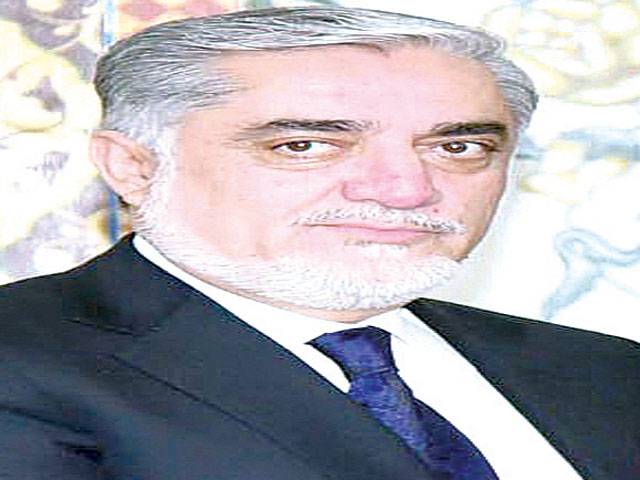Afghanistan’s Abdullah arrives in Islamabad as peace process moves forward

HCNR Chairman to meet Pakistani leadership | Islamabad committed to fraternal ties with Kabul
ISLAMABAD - Chairman of the High Council for National Reconciliation (HCNR)of Afghanistan Dr Abdullah Abdullah will visit Islamabad today for a three-day trip to hold talks with the Pakistani leadership amid progress on the Afghan peace process.
Abdullah will be accompanied by a high-level delegation including prominent members of the High Council for National Reconciliation, the foreign ministry said yesterday.
During the visit, Abdullah will call on President Arif Alvi, Prime Minister Imran Khan and will have interaction with Chairman Senate Sadiq Sanjrani, Speaker National Assembly Asad Qaisar, Foreign Minister Shah Mehmood Qureshi and other dignitaries.
He will deliver a key-note address at the Institute of Strategic Studies Islamabad and also have interaction with the media, said a foreign ministry statement.
This is Abdullah’s first visit to Pakistan in his capacity as Chairman of the High Council for National Reconciliation. The visit will provide an opportunity for wide-ranging exchange of views on the Afghan peace process and strengthening of Pakistan-Afghanistan bilateral relations and people-to-people interaction, added the statement.
“Pakistan attaches high importance to its fraternal ties with Afghanistan, rooted deep in shared history, faith, culture, values and traditions. Pakistan fully supports all efforts for peace, stability and prosperity of the Afghan people. The visit of Dr Abdullah Abdullah will contribute to further strengthening amity, brotherhood and close cooperation between the two countries,” the statement said.
Abdullah was invited by Prime Minister Khan, according to his office, the High Council of National Reconciliation, which is a top-level body designated to broker a peace deal with the insurgents.
Last week, addressing the US Council on Foreign Relations think tank, Abdullah said there was a “lot of mistrust, founded or unfounded” with Pakistan, as well as “lots of grievances on both sides.”
In a separate interview, Abdullah called for finding a “middle ground” in talks with the Taliban to achieve sustainable peace in the war-ravaged country.
In an unprecedented development, the government representatives and the leaders of the Taliban had met in Doha for landmark intra-Afghan talks that began on September 12.
“Situation here (Afghanistan) should also change and people should see it. We still insist upon notable reduction in violence, humanitarian cease-fire, and eventually complete and nationwide truce,” said Abdullah, who returned to Kabul last week after attending the inaugural ceremony of the intra-Afghan talks.
Abdullah claims a number of Taliban prisoners who were released by the Afghan government as a condition for peace talks had taken up arms again.
“I do know that some have returned to the battlefield, which is a violation of the agreement that they had made,” Abdullah said during the online conference with the US Council on Foreign Relations.
Abdullah said talks between the two sides had begun in Doha on a positive note, as the delegations built familiarity with each other.
Yet, he said, the level of violence inside Afghanistan had not fallen and he called on the US, which launched the peace process with its own deal with the Taliban in February, to pressure the armed group to agree to a ceasefire. The US also involved Pakistan, which maintains ties with the Taliban, in the Doha agreement. “Unfortunately, so far, the level of violence is very high and to a level that is not acceptable for the people,” Abdullah said.
“I repeat my call to the Taliban themselves, and also to all partners who have any leverage over the Taliban, to press on that point,” he added.
US chief negotiator Zalmay Khalilzad said a withdrawal of US troops as outlined in the US-Taliban agreement would halt, with approximately 4,500 soldiers remaining in Afghanistan in November while Washington assesses whether the armed group were living up to their pledges.
“Further withdrawals will be determined based on conditions on the ground and delivery by the Taliban on their commitments,” Khalilzad told a hearing of the House oversight committee. The US has slashed troop numbers in Afghanistan by more than half from above 12,000.
Under President Donald Trump’s promise to end US involvement in wars abroad, Washington has pledged to withdraw all forces by May 2021 if the Taliban and the Kabul government can achieve a solid peace agreement.
“By any measure, the current levels of violence are too high. We know that the reductions are possible,” Khalilzad said, noting that short ceasefires had been respected by the Taliban in the past.
Ahead of Abdullah’s visit, Prime Minister Imran Khan spoke to Afghan President Ashraf Ghani over the telephone and discussed the ongoing peace process in Afghanistan to end the 19-years long conflict in the war-torn country.
“The Prime Minister reaffirmed Pakistan’s steadfast support to the Afghan peace process and noted the positive results of these efforts culminating in US-Taliban Peace Agreement and the commencement of Intra-Afghan Negotiations. He also appreciated the steps taken by relevant sides to enable the start of Intra-Afghan Negotiations in Doha,” said an official statement.
The premier also emphasized the importance of all Afghan parties working for reduction in violence leading to ceasefire.
“The Prime Minister further underscored that all Afghan stakeholders must seize this historic opportunity and work together to secure an inclusive and comprehensive political agreement through the Afghan-led and Afghan-owed process,” the statement added.
PM Khan welcomed the visit of Abdullah to Pakistan saying Pakistan supported peace and stability in Afghanistan.





